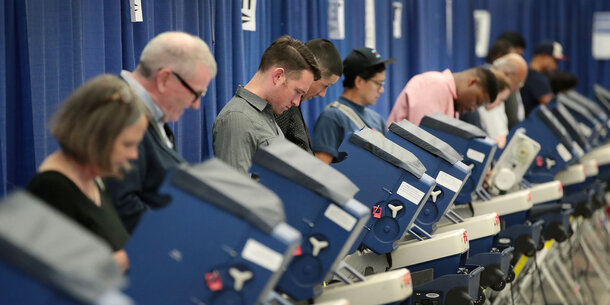This originally appeared in The Fulcrum.
In the last weeks of Donald Trump’s presidency, anxiety grew over what he might do to try to hold on to the White House. Attention focused on emergency powers and whether he could exploit them to block the Electoral College vote count or deploy the military to prevent a peaceful transition of power. As it turned out, Trump wielded the power of an angry mob rather than the emergency authorities granted to the chief executive, and Congress certified the election results nonetheless.
But it would be a serious mistake to wipe our collective forehead and move on.
While invoking emergency powers would not have enabled all the actions people feared, many of them give presidents tools that could be used to undermine democracy.
House Democrats have written sweeping legislation, titling it the Protecting Our Democracy Act, that would significantly reduce these powers’ potential for abuse. Congress should enact that bill now, before the memory of our nation’s close call fades.
The measure contains two important reforms to emergency powers. The first focuses on the National Emergencies Act, under which presidents may declare a national emergency and thereby unlock enhanced powers contained in more than 120 different statutory provisions. Trump declared more national emergencies than any previous president over a four-year period. Most notably, he declared an emergency in order to secure billions of dollars in federal funding, which Congress had refused to provide, for a wall along the southern border.
Notwithstanding Trump’s aggressive use of the NEA, he could have gone much further. Although no laws allow presidents to block vote counts or declare martial law, there is one statute that permits presidents, during a national emergency, to take over or shut down radio stations and communications facilities. Another law allows presidents to freeze the assets of anyone, including any American, for the purpose of addressing a foreign threat. Still others allow presidents to control domestic transportation, prohibit major exports — and even suspend the prohibition on government testing of chemical and biological agents on unwitting human subjects.
Congress’ ability to check presidents’ exercise of these powers is limited. As originally written in 1976, the NEA allowed Congress to terminate an emergency declaration using a “legislative veto” — a resolution, adopted by simple majorities of the House and Senate, that goes into effect without the president’s signature. In 1983, however, the Supreme Court deemed legislative vetoes unconstitutional. Without that mechanism, the only current way for Congress to end a state of emergency against the president’s wishes is to pass legislation with veto-proof two-thirds majorities in both the House and Senate.
The new legislation would correct this imbalance of power by requiring emergency declarations to expire after 20 days if not approved by Congress. This would give presidents flexibility in the immediate throes of a crisis, while creating a backstop in the event of presidential overreach or abuse. There is broad bipartisan support for this approach: It is patterned on a measure by conservative GOP Sen. Mike Lee of Utah, which was approved by the Homeland Security Committee in 2019 with the support of 12 of the committee’s 14 members.
The new measure also addresses a second, less-well-known category of emergency powers — those reflected in presidential emergency action documents. These are directives drafted in anticipation of an assortment of worst-case scenarios, ready for the president’s signature if any such scenario should come to pass. They originated as part of the Eisenhower administration’s planning for a possible Soviet nuclear attack.
By Washington standards, presidential emergency action documents are an extraordinarily well-kept secret. None has ever been released or leaked. From other official documents, however, we know that draft directives in the Cold War’s early decades purported to authorize martial law, censorship of the press, warrantless searches of property and the roundup and detention of “subversives.” The current content of these documents is unknown, but they presumably reflect the outer limit of whatever powers a given administration claims to possess.
That’s worrisome, as the executive branch’s interpretations of its own power have only expanded in recent decades. Modern administrations increasingly argue the Constitution gives presidents broad “inherent” powers not specified in the actual text. We don’t know the full extent of these claimed “inherent” powers because the legal opinions that describe them are often secret. Presidential emergency action documents, which quite likely rely on these claimed powers, are not even shared with Congress. By contrast, even highly classified covert military and intelligence operations must be shared with the Gang of Eight, the top leaders from each party in the House and Senate and the top lawmakers from each party on the two congressional Intelligence committees.
The new legislation includes a provision, modeled on a bill by Democratic Sen. Ed Markey of Massachusetts, that would require disclosure of presidential emergency action documents to the relevant committees of Congress. It would not require or permit public disclosure of any classified information. It would simply enable Congress to perform its constitutionally mandated oversight function, allowing lawmakers to exercise the power of the purse to prevent presidential abuses of power.
Some might argue these reforms are unnecessary now that Trump has left office. But he was not the first president to abuse emergency powers — recall the internment of Japanese Americans during World War II under President Franklin D. Roosevelt and the CIA’s torture of detainees after Sept. 11 under President George W. Bush — and he surely will not be the last.
Delaying reform because the potential for abuse has temporarily lessened is the civic equivalent of leaving a leak in the roof unfixed because it just stopped raining. Congress should move swiftly to enact these and other provisions of the new legislation before the next storm hits.



